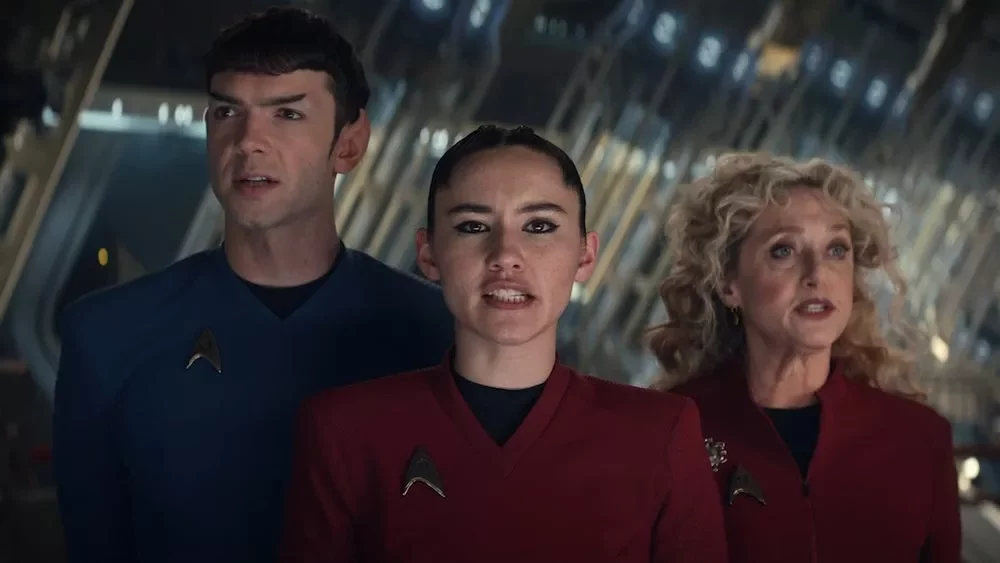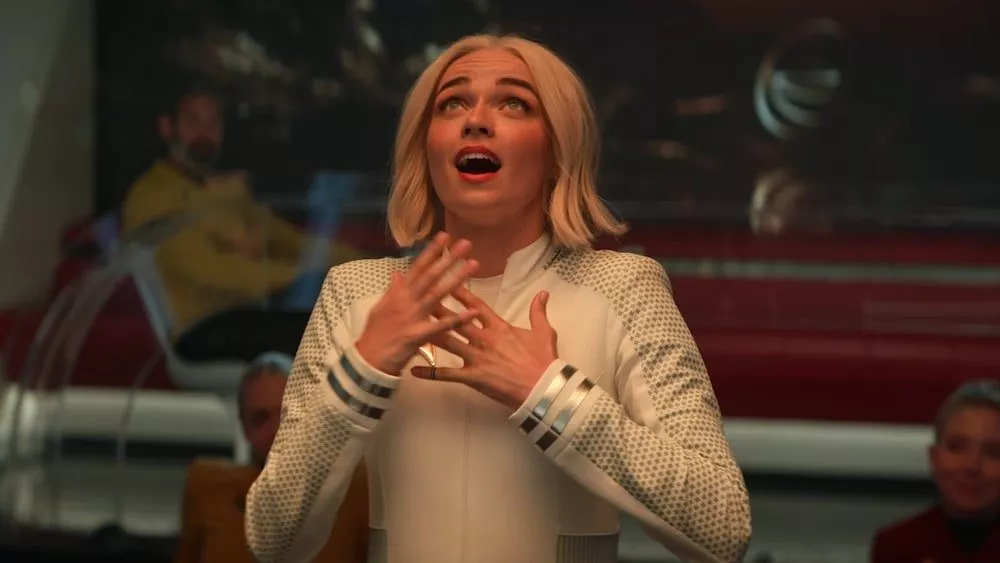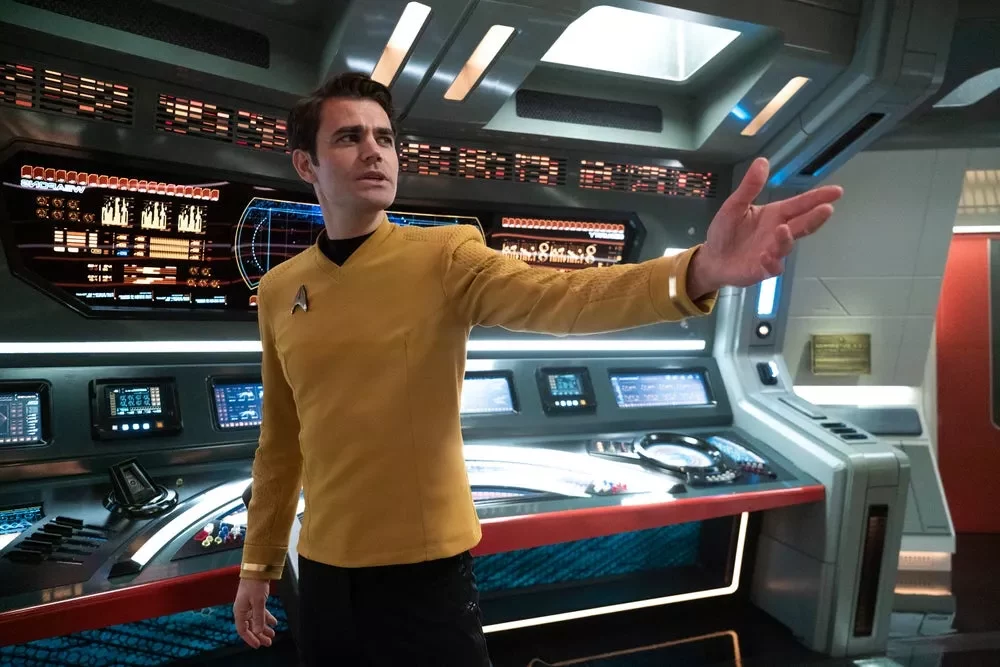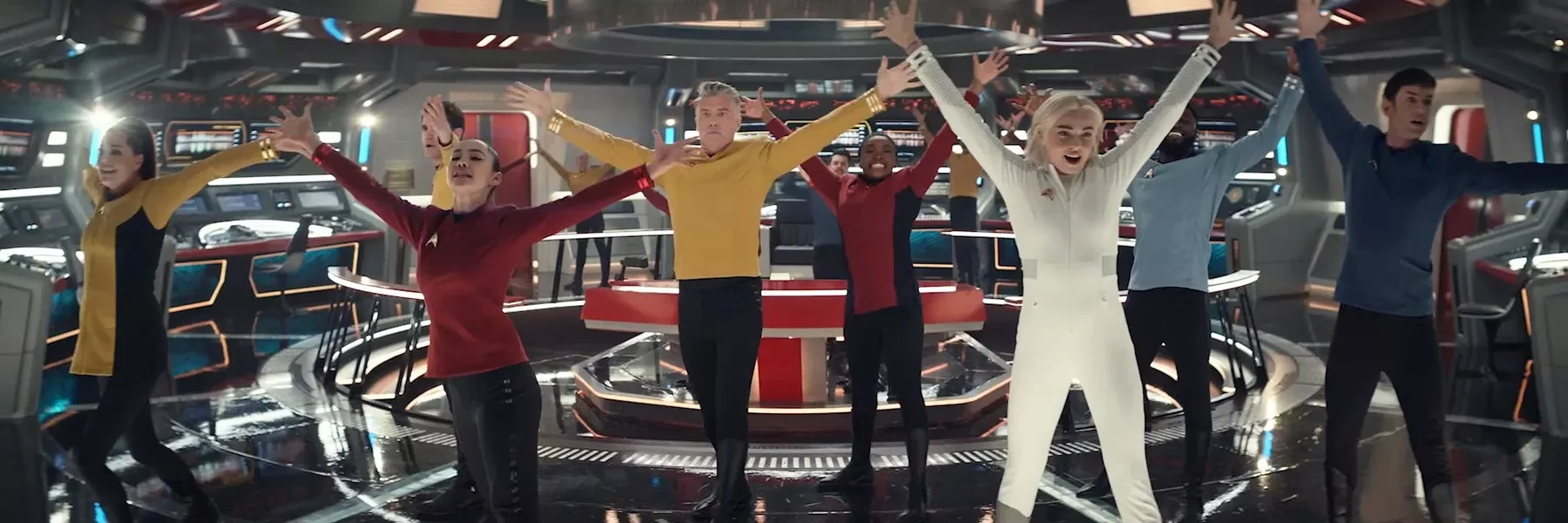Throughout its multifaceted journey, Star Trek has excelled in crafting compelling drama. From the poignant depths of “The City on the Edge of Forever” in The Original Series, to the shadowed complexities of “Yesterday’s Enterprise” in The Next Generation and “In the Pale Moonlight” in Deep Space Nine, and further to the grandeur of action in Discovery’s “The Red Angel” and the intense stakes portrayed in Strange New Worlds’ “A Quality of Mercy,” Star Trek, in all its iterations, has showcased an ability to deliver gravitas and emotion.
Yet, within its diverse tapestry, Star Trek also embraces whimsy, as aptly demonstrated in the recent musical escapade of Strange New Worlds’ episode, “Subspace Rhapsody.” The episodic format allows the series to oscillate between the unconventional and the serious, a dynamic that finds resonance even in more serialized narratives. In the contemporary Trek era, creators have increasingly embraced this lighthearted facet, bestowing an enriching vitality upon the franchise.
Upon Star Trek’s television resurgence in 2017, the initial trajectory shied away from lighthearted narratives. Both Discovery and Picard underscored high-stakes narratives, interwoven with moments of levity. Though not devoid of humor, the inclination towards outright “silliness” was restrained.

However, a transformative shift came with Lower Decks, the second animated series in the Star Trek pantheon, yet the first to be seamlessly woven into the franchise’s fabric. This delightful show profoundly comprehends the inherent whimsy within Gene Roddenberry’s universe. It artfully harmonizes frivolity and earnestness, captivating viewers while maintaining narrative authenticity. Lower Decks playfully lampoons every Star Trek trope, all delivered with an adoration and genuineness that resonates brilliantly.
In the past year or two, the triumphant reception of Lower Decks has emboldened Star Trek’s diverse writers to re-embrace the franchise’s lighter essence. Prodigy, another animated series, pays a charming tribute to The Original Series in “All the World’s a Stage.” Furthermore, it unflinchingly acknowledges the infamous Voyager episode, “Threshold,” long held under a shadow of embarrassment. Yet, within Prodigy’s “Mindwalk,” Janeway cheerfully recounts her transformation into a salamander, deftly folding this absurdity into the Trek canon and crafting an endearing and comical narrative.
As Star Trek continues to evolve, its magnetic blend of drama and whimsy remains a captivating testament to its enduring allure.
And this leads us to the realm of “Strange New Worlds,” a series that masterfully exploits its episodic structure, delivering a blend of somber, gripping tales alongside lighthearted and enjoyable escapades. In its inaugural season, akin to “Prodigy,” the show introduced a bodyswap narrative early on in “Spock Amok,” a renowned motif in science fiction and fantasy known for its inherent humor. Episode 8, titled “The Elysian Kingdom,” defied expectations by conjuring a full-fledged fantasy realm within the ship, complete with uproarious out-of-character performances from the main cast. Remarkably, “The Elysian Kingdom” expertly juxtaposed its whimsical elements with genuine emotion and character-driven drama, serving as the poignant crescendo for M’Benga’s (Babs Olusanmokun) heartrending narrative involving his daughter. The infusion of levity and amusement preceding this pivotal moment heightened its emotional impact, rendering it even more profound.

In its sophomore season, “Strange New Worlds” further explored the romantic tribulations of Spock (Ethan Peck) in “Charades,” while fully embracing its lighter side in Episode 7, “Those Old Scientists,” a long-awaited crossover with “Lower Decks.” This partly animated episode seamlessly harmonized the exuberance of “Lower Decks” with the underlying seriousness characteristic of “Strange New Worlds.” As with “The Elysian Kingdom,” it skillfully interwove moments of earnestness and character-driven narratives, as Pike (Anson Mount) confronted his impending fate and Chapel (Jess Bush) silently suffered heartache onscreen. Amidst these emotive sequences, the episode treated fans to the delightful absurdity of Boimler channeling Riker on the Captain’s display saddle, and Mariner’s bafflement over “Hot Spock.” A gift to long-standing enthusiasts of the franchise, “Those Old Scientists” encapsulated the essence cherished within both “Lower Decks” and “Strange New Worlds”: a fusion of lightheartedness and compelling drama.
Now, nestled between two particularly serious episodes – “Under the Cloak of War” – “Strange New Worlds” unfurls the epitome of the interplay between silliness and character-driven drama: a musical installment titled “Subspace Rhapsody.” While Star Trek has dabbled sparingly in musical ventures, this episode channels the spirit of cherished musical chapters in series like “Xena: Warrior Princess” and “Buffy the Vampire Slayer.” Notably, it leverages the musical hour to unveil the characters’ suppressed emotions, interwoven with unabashed hilarity born from the inherently quirky concept.

The episode cleverly pays homage to classics while exuding a Douglas Adams-esque aura, magnified by recurring references to “improbability.” The bridge scene, where Pike’s composure falters, and the Klingon dance sequence brilliantly capture this duality. Amidst the levity, poignant solos from La’an (Christina Chong) and Uhura (Celia Rose Gooding) and Chapel’s response to Spock’s emotional struggle underscore the underlying gravitas. “Subspace Rhapsody” is a visual delight, a nostalgic nod to “The Original Series” culminating in a poignant reprise of its theme music. This, accompanied by Pike’s wry jest mirroring Kirk’s customary quips, reaffirms the enduring essence of the franchise.
As we contemplate the trajectory of Star Trek, Picard concludes, and Discovery and Prodigy face their final seasons (hopefully not in Prodigy’s case – #SaveStarTrekProdigy), we are left with the realm of “Lower Decks,” “Strange New Worlds,” and an upcoming series set in Starfleet Academy of the 32nd century. The latter promises a blend of joviality amid serious endeavors, epitomized by anticipated keg parties and other light-hearted escapades. Although a potential spin-off, “Star Trek: Legacy,” may embrace a more solemn tone, the future of such a venture remains uncertain. Yet, the prospect of intertwining seriousness with a dash of levity, reminiscent of Seven of Nine’s enchanting vocals, stirs anticipation. In these times, as our external world grapples with shadows, the burgeoning silliness within Star Trek offers a radiant counterbalance. A beacon of optimism, the franchise’s propensity for mirth ensures its unwavering role as a source of hope and inspiration.
